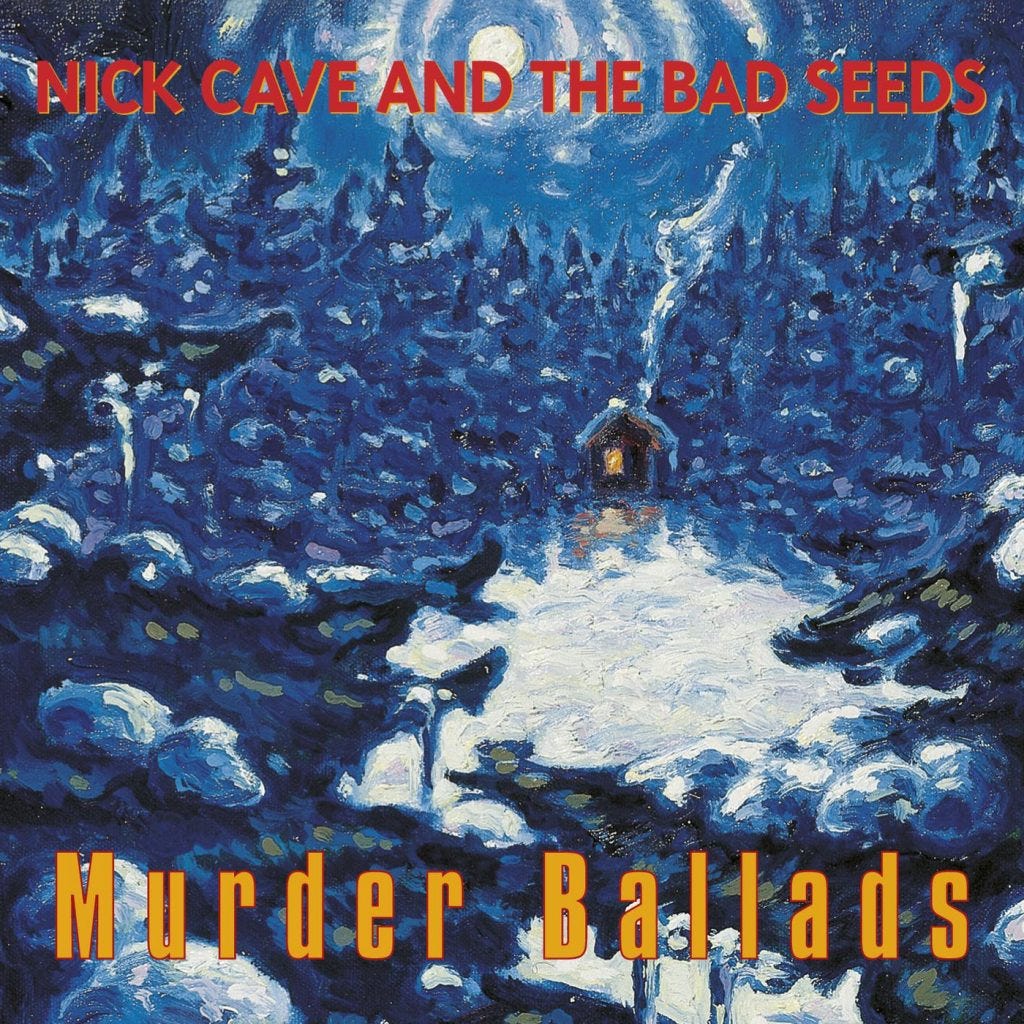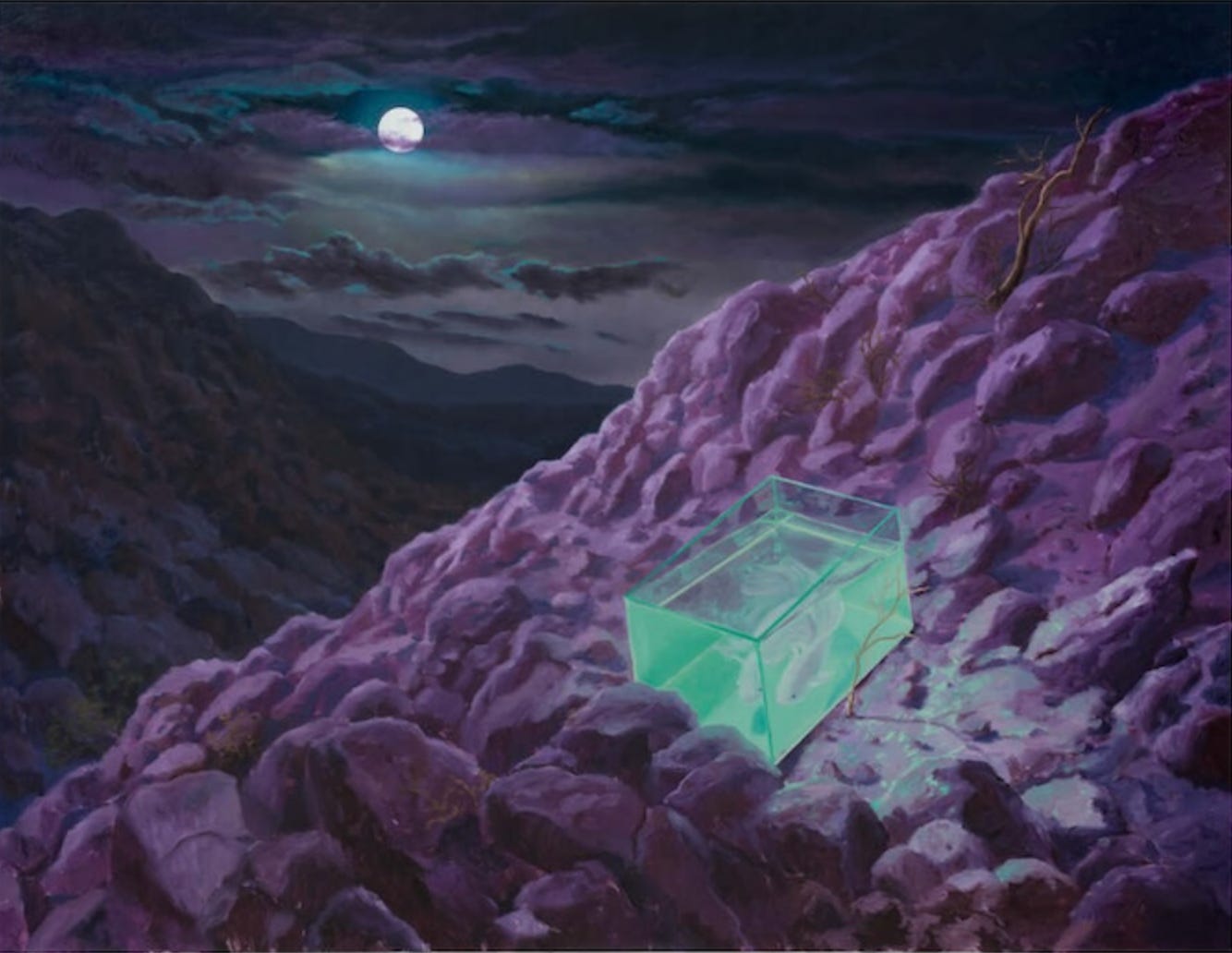For Still, The Fire Of Love Is True
“Vision is the art of seeing things invisible.”―Jonathan Swift
Musician Nick Cave has been very much in the news as of late…just yesterday with the announcement that Matt Smith will be adapting his book The Death of Bunny Munro into a film, which should be an interesting production given the crazy, dark (dark) antics of the hero, on a journey with his son, with a special guest serial killer. And just last week, the searing letter Nick wrote about ChatGPT, where he called the AI innovation an “erosion of the world’s soul” which should never try and replicate his style was read publicly by Steven Fry, which includes the great quote:
It rejects that there is a collective, essential and unconscious human spirit underpinning our existence, connecting us all through our mutual striving.
The Artificial Intelligence revolution has done nothing but scared the hell out of most musicians and many industry vets. As a new-world-technology cynic, I sway towards the words Nick has written…and yes, I am sure many friends and readers will immediately retort by suggesting AI will be more of a positive-producing tool…something we can learn to use to help with our process. My friend Ken Goldberg, a robotics prof at UC Berkeley (GO BEARS, WE GOT THE AXE!) and an artist, wrote an opinion piece asking us all to give AI a chance, and it is worth a read. To me, Nick’s letter reminds me of a turned-around version of John Perry Barlow’s A Declaration of the Independence of Cyberspace, both focusing on the internet as a tool…Barlow demanding it remain an open tool to humanity, not ruled by government and industry while Cave talks of how this evolved tool/technology should not impose “itself” on the artist/human, on the artistic process and product. On dumbing down both. Oh, how far we have come.
But this newsletter is not about the AI/ART debate…while there is definitely a place for that.
Between Nick Cave’s letters of warning and the film adaptions of his books, between the sporadic artistically evolutionary records he has released and his ongoing blog where he bares his soul and advice to his fans, to the numerous soundtracks and the rave-reviewed tours…Nick Cave is having a Renaissance of sorts, albeit one framed in deep tragedy. How can a person survive the loss of two children, at two separate times, as Nick Cave has? He has poured himself into his art…he has wielded his sorrow into some of the most beautifully tragic recordings anyone has ever produced, filled with complex and sacred arrangements, masterfully yarning stories as if he was a wandering teller from the middle ages. I am listening to his latest record of original material, 2019’s Ghosteen, as I write these words. The soundscapes he creates with drones and pulses, matured sounds from the punk/industrial revolution that he took part in…his soft spoke-singing narration…projects lush moving pictures on the brain, soft-landing the listener into a netherworld that, as Sy Safransky recently said of his magazine The Sun, “celebrates the beauty and the sadness of being alive.” The record, along with its predecessor Skeleton Tree, recorded after the accidental death of his first child, offer an almost scientific look—through art—into ways of trying to understand fantastic grief. There are no silver linings, only revelations, within the ingenious art it has propelled Cave to make.
It is only recently that I have been able to once again listen to Nick Cave’s records. I loved Nick Cave and the Bad Seeds as a kid…introduced to him while late-night DJing at KUSF in high school. The Mercy Seat, dammit…that song hit me deeply; it starts so quietly, with dark back-ally creaks, building up to driving a Mad Maxian guitar-electric freeway…pulverizing you as it builds and builds. His records with his ever great ever revolving Bad Seeds: Tender Prey, The Good Son, Henry’s Dream: record after enticing record of dark, gothic, singer songwriter rock ‘n roll…one of my soundtracks through college. Later, seeing show after show of Nick Cave and the Bad Seeds on the then-traveling 1994 Lollapalooza tour…even with his dark character uncharacteristically playing in the blazing sunlight days…was witnessing a fantastic, dialed-in band-in-black (one of the best on that stage that summer) blowing through sets of great song after great song. When it was announced a few years later that Nick was looking for a new record label in America…and the tape that was played for me by Jo Lenardi at a weekly Reprise A&R meeting was The Murder Ballads…another masterpiece…I leapt at the chance of signing him in the US…I dropped everything and called Daniel Miller at Mute, CEO of the parent label that had Nick under contract. Daniel and I spoke..and we started putting together a deal.
But working with Nick Cave was one of the more unpleasant experiences I had as an A&R executive. Maybe it was the meeting I had with him, after flying to the UK to try and get him to tour America again…to back the record we had paid for and released…which he had refused to do. Sure, he took the meeting with me, but he spent the time at the Mute offices around the table in shades, uninterested, signing pictures of himself, while Mick Harvey (who was a truly nice person) discussed the issues the band had with America. America was unhealthy for the Bad Seeds in every way that Rock ‘n Roll can be unhealthy…and why go back there anyway if their records were top ten in the charts all over Europe? (“C’mon,” I said, “you can’t ditch the place whose music has been a main source of influence!”).
Nick did not bother learning my name for the first year we worked together, once even pushing me aside at the Royal Albert Hall after the Murder Ballads show (a great performance featuring Kylie Minogue and PJ Harvey), when he caught the eyes of a damsel from across the room (“You don’t even know who I am,” I said. He was taken aback. “David Katznelson, Warner/Reprise Records. Your label in then states.” “Oh Dayyy-vid,” he said poshly, “of course I knew it was you…and I will be right back to catch up.” Not.).
We put out three Nick Cave and the Bad Seeds records through the deal we made with Mute: the fantastic Murder Ballads and The Boatsman’s Call and the solid And No More Shall We Part. While there were times we spoke…and there were a few short conversations woven in through the years…he never gave a sense of really caring…of really giving a shit…America was not a big enough market to care about, but he would take the money since he could…and that left a bad bad taste in my mouth. Yes, the music was great. Yes, the Bad Seeds were a stellar band featuring musicians like Blixa Bargeld who were legends in their own right. But one of the biggest problems about working with musicians that you love, is that when they come off as jerks, it taints the listening ear.
I have followed the very public tragedies that have befallen Nick Cave over the last decade. No one should ever have to live through what he has. But my empathy did not lead me to listening once again to his art. For some strange reason, over the past few months, songs from his last few albums have been thrown on turntables, on car stereos, during friend listening sessions. Not only the new stuff…from the recent releases…but classic old stuff and the wonderful mid-period records that I was connected to. And it brought back to me the magic of Nick Cave.
And more: a documentary of Nick Cave’s first band The Birthday Party was released recently. It is called Mutiny In Heaven, and while I have yet to see it (oh, I will), its trailer propelled me to listen to the darkly anarchistic, bombastic tirades that the band stormed the world with. Then, at my friend David Hyman’s house the other night, sitting in his tremendous high fidelity record room, we listened to epic Lyre of Orpheus that went into the popish groove of Breathless….which I have been listening to incessantly ever since. It was at that moment that I realized: that it was good to have the music and stories of Nick Cave back in my life.
***And Nick: if this somehow ever gets to you: I am sorry for picking a fight backstage at the Wiltern when we last saw each other. Maybe you were trying to leave things ok between us…I just couldn’t see that.
A Dedication to Solomon Mansoor: Remembering the architect of LA's club renaissance
My friend Raymond Roker, founder of the great URB magazine (which I actually wrote for under an alias), posted this remembrance of Solomon Mansoor on hiw URG-oriented newsletter. I had not been aware of his career, and am thankful I know a little bit more now….
Interview Magazine Presents: The Jodie Foster Guide to Aging in Hollywood
“When I was a kid, I really wanted to go to Disneyland and not be recognized. It’s not that people bothered me and it’s not like I would not respond or take pictures. It was just that I wanted a pure experience. There are actually a lot of experiences that I now recognize I missed out on a bit…When you meet people for the first time they already know you. They already know what your elbows look like. They already know what you look like when you cry or scream. It does taint your experience with people. And I guess sometimes I feel—maybe everybody does—a little self-conscious about dancing. Maybe if I thought nobody knew who I was or would remember me, I would just go nonstop dancing.”
After Melville: The great author is eternally pursued and rediscovered
I did not realize that most of Melville’s classics were out of print when he died (It is his birthday today, by the way). I also did not realize: Since the mid-twentieth century, Delbanco notes, “there has been a steady stream of new Melvilles, all of whom seem somehow able to keep up with the preoccupations of the moment.” He lists a few:
myth-and-symbol Melville
countercultural Melville
anti-war Melville
environmentalist Melville
gay or bisexual Melville
multicultural Melville
global Melville
Into the Silence: Yasuhiro Ogawa's Visual Ode to a 17th Century Poet
“The story of Matsuo Bashō's journey through the northern provinces of Japan in the 17th century, is recounted in his travelogue ‘The Narrow Road to the Deep North,’ (‘Oku no Hosomichi’). In the summer of 1689, Bashō set out on his journey with his traveling companion Sora. They traveled on foot, carrying only minimal provisions and staying in humble lodgings along the way. Bashō was seeking inspiration for his poetry, and he found it in the natural beauty and cultural richness of the places he visited. Like Bashō before him, Ogawa set out on a journey through the Tōhoku region, unlike Bashō, who traveled on foot with pen in hand, Ogawa preferred to move by train with camera in hand…”
Booker Prize Winner Paul Lynch on the Fundamental Dignity of the Individual
“Prophet Song is a terrifying book…Paul Lynch’s fifth novel comes direct from the can’t-happen-here school of near-future dystopian, but the book’s real mojo originates not with the plausibility of the premise (the Republic of Ireland deteriorating rapidly from right-wing populism to outright civil war), but the crawling-on-skin effect of the language. Prophet Song is a 300-page panic attack. It starts with a hum of dread.”
The Failure Of Language
By Jacqueline Berger
First day of class, I ask the students, by way
of introduction, what they believe:
Language is our best tool, or language fails
to express what we know and feel.
We go around the room.
Almost everyone sides with failure.
Is it because they’re young,
still find it hard to say what they mean?
Or are they romantics, holding music and art, the body,
anything wordless as the best way in?
I think about the poet helping his wife to die,
calling his heart helpless as crushed birds
and the soles of her feet the voices of children
calling in the lemon grove, because the tool
must sometimes be bent to work.
Sitting next to my friend in her hospital bed,
she tells me she’s not going to make it,
doesn’t think she wants to,
all year running from the deep she’s now drowning in.
I change the flowers in the vase,
rub cream into her hands and feet.
When I lean down to kiss her goodbye,
I whisper I love you, words that maybe
have lost their meaning, being asked to stand
for so many unspoken particulars.
The sky when I walk to the parking lot
this last weekend of summer
is an opal, the heat pinkening above the trees
which dusk turns the color of ash.
Everything we love fails, I didn’t tell my students,
if by fails we mean ends or changes,
if by love we mean what sustains us.
Language is what honors the vanishing.
Or is language what slows the leaving?
Or does it only deepen what we know of loss?
My students believe it’s important
to get the words right.
Once said, they can never be retrieved.
It takes years to learn to be awkward.
At their age, each word must be carefully chosen
to communicate the yes, but also leave room
for the not really, just kidding, a gateway car
with the engine running.
Inside us, constellations,
bit thread knotted into night’s black drape.
There are no right words,
if by right we mean perfect,
if by perfect we mean able to save us.
Four of us pack up our friend’s apartment.
Suddenly she can’t live unassisted.
I remember this glass, part of a set
I bought her years ago
when she became for a time a scotch drinker.
I bought it for its weight, something
solid to hold, and for the way an inch or two
of amber would look against its etched walls.
I wrap it in newspaper and add it to the box marked
Kitchen.
It’s my friend herself who is fragile.
When I take her out to eat, each step is work.
The restaurant is loud and bright.
She wants to know if she looks normal.
I make my words soft. Fine,
which might be the most useless word in English,
everything is going to be fine.

















Though I object STRONGLY to the parenthetical phrase included in the first paragraph of this post, overall, it's yet another excellent one, David. (Hehe!) There are a few others, I suppose, but now that McCarthy's dead, among the living only Knausgaard really captures me book after book, page after page. Bored and bogus'd by virtually all contemporary novels I read (particularly American ones), I generally stick to the classics ("The Eternal Husband" by Dostoevsky is what I'm currently on) and I love this from Lynch's interview: "When I teach creative writing, I remind students that a shelf of classics is a source of energy and great works raise your consciousness and remind you what the standard is." The rock I live under is so comfortable that I've only encountered Lynch since the Booker Prize was awarded him. "Prose mastery...","There's not an ordinary sentence in the book." That's what I'm talkin' 'bout! He goes into the queue! (All this said, I've read Nick Cave's two novels twice each. Both superb!)
I was a student of James Melville Cox at dartmouth in the ‘80s. he had a great riff that he used once per quarter every year for many years I’m sure I’ve seen it in print Something like “people ask me if Moby Dick is about sex: it’s a sperm whale, his name is dick… and I am Cox. Ha ha hee hee. Ha ha.